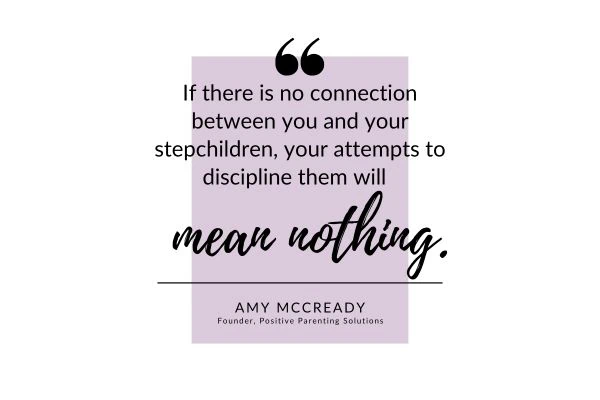

When introducing children to a new family dynamic, one thing is certain…
Kids will naturally test the waters.
Whether it’s adding a new baby into the mix, a stay-at-home parent re-entering the workforce, or going through the process of divorce–no matter the circumstances, changes like these rock everyone’s worlds (kids and adults alike). And when worlds are shaken, pushback is to be expected.
Still, nothing can quite compare to the radical shift that occurs when two families blend together to become one.
If this is a venture you’re embarking on, you know that navigating the murky waters of stepparenting isn’t for the faint of heart. From getting to know your new stepchildren to establishing your place in an already-formed family, it may feel like an uphill battle lies before you. And a long one at that.
In fact, bestselling author, therapist, and blended family expert Ron L. Deal from Smart Stepfamilies says, “The average blended family needs between five and seven years to merge and form a shared identity.”
Naturally, you have hundreds of questions running through your mind right now. But I’m willing to bet there’s one question that stands out above all others. And it’s a question stepparents have been asking for years…
Am I allowed to discipline my stepchildren?
As a parenting educator, I hear this question…a lot! Sometimes it comes from parents taking my FREE PARENTING WEBINAR. Other times it’s brought up by those who have already signed up for the 7-Step Parenting Success System® course.
While I’d love to give you a straightforward, cut-and-dry answer, this is a complicated topic. And learning how to navigate this new territory is just one of many hurdles blended families have to overcome.
But just because it’s complicated doesn’t mean it’s impossible!
If you genuinely want to know if you can discipline your new children, the answer is yes–but only alongside the proper tools that nurture your budding relationship.
However, before we get to the relationship building, the first critical step is to understand what discipline even means.
So let’s discuss…
What is Discipline?
From a Positive Parenting Solutions perspective, the main goal of discipline should always be to bring out the absolute best in your kids! Sure, they may exhibit less-than-ideal behaviors, but they are not less-than-ideal children.
They only need to be shown how to behave properly (with you leading the way).
Now, this doesn’t mean you have to be an overly permissive or strictly punitive stepparent. In fact, I don’t recommend either of those options. Instead, seek to properly train your stepchildren. When misbehaviors arise, they can learn and grow from the experience.
Of course, parents and stepparents alike often find themselves stuck, confusing two very different concepts: punishment and discipline.
To be clear, when discussing discipline, we are NOT talking about punishment.
Dr. Jane Nelsen–the mother of Positive Discipline–best-described punishment as anything that causes a child to feel blame, shame, or pain. It relies on using negative feelings to end negative behavior, which simply doesn’t work.
Our job as parents (and stepparents) isn’t to scare or threaten our kids into behaving properly, giving them no understanding of why their behavior was wrong in the first place. Our job is to guide, mold, and instruct them on how to behave.
It’s training! And it works wonders, now and for years to come.
So how can you discipline without stepping into punishment territory?
Start with clear communication…
Kids need to know what behavior is acceptable and what isn’t. But how are they supposed to know if it isn’t clearly communicated to them?
Once you and your spouse are in lock-step agreement on your family’s rules, bring the kids into the conversation during a family meeting. Allow them a say in the process of figuring out which rules are currently working and which are not.
You may be surprised to find out that disobedience isn’t the issue at all! Plus, the more you get their buy-in, the more they’ll be willing to cooperate within the family rules.
Of course, certain misbehaviors have consequences, and your kids need to know what those consequences are beforehand. But getting everyone on the same page rule-wise may be your ticket to avoiding consequences altogether.
How amazing is that!
Also, your discipline should come from a place of kindness and understanding.
When misbehaviors arise, don’t blindly react in the heat of the moment. Be intentional about how you choose to discipline your stepkids (and consistent with how your partner feels about the situation). Your thoughts and actions should always be grounded in how you will help them make better decisions down the road.
This doesn’t mean backing off and letting them walk all over you. You can be firm in your decision while still respecting your stepchild. Not only will they respond better to this type of discipline, but you’ll see the long-term effectiveness as time goes on.
Now that you know what it means to discipline, let’s put it into action. How can you, as a stepparent, discipline your stepchildren?
Build a Relationship First
Just as you are still building a relationship with your new spouse, your new stepchildren will also need some of your time and attention. During that honeymoon period, discipline will probably be the last thing on your mind; but I can assure you the topic will eventually come up.
And if there is one thing I can promise you, it’s this:
If there is no connection between you and your stepchildren, your attempts to discipline them will mean nothing.
Experts agree that until some sort of familial bond is formed with your stepchildren, they’ll likely have a hard time accepting you as an authority figure and may push back against any disciplinary attempts.
This is why it’s essential to focus on building a strong, positive relationship from day one. And one of the best ways to establish a healthy relationship is to connect with your stepkids through quality one-on-one time together.
Start a MIND, BODY AND SOUL TIME® Schedule
Nothing tells a child, “You’re so important to me,” quite like making special time each day to pour your attention into them.
Here at Positive Parenting Solutions, we refer to this as a MIND, BODY AND SOUL TIME® schedule. That’s 10-15 (distraction-free) minutes of your day spent doing something they want to do.
This could be playing your stepdaughter’s favorite board game or listening along as your stepson tells you about each of his 500 Pokémon cards. As long as you allow them to choose the activity (within reason), the possibilities are truly endless!
You’ll get to know them. They’ll get to know you. And you’ll both end up with a stronger, more established connection with one another.


Encourage, Encourage, Encourage!
Another fantastic relationship-strengthening tool is the use of encouragement.
Like many well-meaning stepparents, your first instinct may be to dole out the praise.
Umm, yeah, Amy. I want them to like me, after all!
I know, I know! It’s so tempting. But pump those brakes just a bit because constant praise does very little to help your relationship in the long run.
In fact, it can even lead to more significant problems down the road.
That’s because praise fosters a need for external motivation–that constant need for others to affirm their value and self-worth. And the more praise your stepkids receive, the more they’ll crave it.
Instead, focus on empowering them through encouraging words.
For example…
Instead of saying, “Wow, bud, you are such a good athlete! Your team couldn’t have won without you,” try, “I know we’re just getting to know each other, but I can tell you work hard at your sport. I bet it feels awesome to be such a great team player.”
This type of encouragement tells him you care while also allowing him to reflect on how his actions make him feel.


Starting a new marriage provides an excellent opportunity for you, your spouse, and your children to focus on building great relationships with one another from the very beginning.
Just remember, connection is far more important than correction. Focus on building the relationship first, then figure out how best to handle the disciplinary action.
That said, here are four important considerations to remember when weighing discipline for your stepchildren.
1. Consider Their Age
New marriages affect children of all ages. But how your stepchildren react to you could be heavily influenced by how old they are when you first come into the family.
For example, younger children tend to push back with their actions, like tantrums or hitting–while older kids often do so with their words. Just ask any stepparent who has ever been on the receiving end of this dreaded comment: “You’re not my real dad/mom!”
Do these words hurt? Of course. But try to understand where the harsh words and actions are coming from without getting defensive. More often than not, a deeper issue lies beneath the surface.
We know that kids have a deeply rooted need to feel power and control over their own lives. But they can’t control their parents’ relationships. Just imagine how frustratingly powerless the situation makes them feel…and try to empathize.
It’s also important to note that younger children typically have an easier time adjusting to new authority figures than older kids. As kids grow up and move into the teenage years, they naturally move on to resisting even their biological parents’ authority.
So don’t take it personally if they do the same with you. Teens and toddlers don’t act the same way (usually…), so you shouldn’t expect to discipline them the same way either.
2. Consider Their Perspective
Your stepchildren were part of a family before you came onto the scene. It would be unfair to pretend that wasn’t the case, especially if they’re still grieving the loss of the family they knew before.
Before you even think about your role as a disciplinarian in their life, take time to consider life from their point of view.
How must it feel to see their parent romantically involved with someone else? What was their family dynamic before you entered into it?
No matter your intentions, there’s a good chance they may see you as the “bad guy.” Not because of anything you have done but simply because of the role you’re stepping into.
And it’s okay for them to feel this way. It’s not your job to fix anything. It’s just your job to understand where they are coming from.
But how can you do that?
Outside a MIND, BODY AND SOUL TIME® schedule, another fantastic way to learn about your new kids and gain their trust is to implement regular Family Meetings.
Think of your new family as a start-up business–one you want to succeed! Just as good businesses succeed when every employee works together, so does a family unit.
Pick a time each week (preferably the same time every week) to sit down together. This is your chance to talk as a family about struggles, brainstorm solutions, and even practice a few team-building exercises.
You’ll never be able to truly understand your stepchildren’s perspectives without first getting them to open up. And the Family Meeting provides the perfect grounds to do just that!
Pro Tip: Positive Parenting Solutions Members can review Step 6 for more details on how to run the best, most effective Family Meeting.
3. Consider Your Spouse
You and your new spouse are a team. But in the early stages of entering your stepchildren’s lives, it’s best to leave the disciplining to your spouse. Not only will your stepchildren recognize this parent as one of authority, but they’ll also feel most safe and comfortable under the gentle guidance of their mom or dad.
Family psychologist Patricia Paper now suggests that stepparents who take the time to establish a foundation of mutual respect and affection are setting themselves up for success because later disciplinary action will be met with less resentment from the stepchild.
This is also an excellent time for you to learn from your spouse. Take note of how they interact with their children, what behavior battles seem to be most common, and what steps they take to encourage better behavior in their kids.
Don’t be afraid to ask your spouse All. The. Questions. (Seriously, just ask!)
Questions like…
How do you prefer to discipline the kids?
What areas of discipline do you feel most strongly about?
What are your absolute “no-nos” when it comes to discipline?
Are you a strong proponent of positive parenting? If not, are you willing to get on board with that?
In the end, your consideration of your spouse, their opinions, and their expertise will be a driving force for your own success as a stepparent. Plus, they’ll feel better knowing how dedicated you are to parenting their children likewise.
And don’t worry that you’re putting all the parenting burden on your spouse. As your relationship with your stepchildren warms and develops, you’ll be able to take on more of the load.
But to start, you focus on connection. Let your spouse focus on correction.


4. Consider Their Other Parent
If you’re actively co-parenting with your stepchild’s biological mother or father, you need to consider them an essential part of the equation regarding when and how you discipline. You, your spouse, and their ex need to be on the same page.
Make it one of your top priorities to include the other parent in your parenting conversations. Consider how they run their household in comparison to how you run yours, and think about what those differences might mean for your stepkids.
For example…
Do you and your spouse avoid paying your kids for doing chores, but their other parent has no issue with it? Are you sticklers for a strict bedtime routine, but it’s not a priority at their other house?
And what about the topic we’re here for–discipline? What types of disciplinary approaches are they comfortable with you taking on as a stepparent?
While you can’t control exactly how the other parent runs their house (as they can’t run yours), it would be wise to discuss the details and get on the same page about as many of these key issues as possible.
Not only will you be working to provide much more stability for your stepchildren, but you’ll also give your stepkids less reason to compare one set of parents to the other.
Now you may be thinking, That’s so much easier said than done, Amy, but you don’t know who I’m dealing with.
And you may be right. But there are parents out there who have been in your same shoes and risen above the conflict victoriously.
In fact, in their book, No One’s the Bitch: A Ten-Step Plan For the Mother and Stepmother Relationship, Jennifer Newcomb Marine and Carol Maine explain how they completely transformed their co-parenting relationship and even became close friends.
Similarly, in the book Blend: The Secret to Co-Parenting and Creating a Balanced Family, author Mashonda Tifrere uses her personal experience co-parenting with her ex-husband Swizz Beatz and his new wife, Alicia Keys, to create a guide for helping families blend in a healthy way.
The truth is kids need both sets of parents fully engaged in their lives. You may not enjoy or get along with your spouse’s ex, but your stepchildren love them. And they obviously love your stepchildren.
Do your best to respect the other parent’s wishes, involve them in your decisions whenever appropriate, and above all else, let adult issues stay adult issues.
When you give your co-parent the consideration and respect you’d want for yourself, you’ll more likely see the same in return.
CTA: Positive Parenting Solutions members, check out the Battle-Tested Blueprint: Divorce & Parenting Apart with Christina McGhee, MSW. Here you’ll find surefire strategies to take the hassle out of co-parenting.
Final Thoughts
Parenting is hard. Full stop.
But stepparenting is on an entirely different level of difficulty. So if this is the life arena you find yourself currently in (or getting ready to enter), take heart! You are most certainly not alone.
At Positive Parenting Solutions, we’re not just here to help the average parent, the biological parent, or the perfect parent. We’re here to help every parent!
As you embark on this new journey in parenthood, I thank you for taking the time to consider our approach, and I wish you the very best of luck on your adventure.
What You Should Do Next:
1. Get Quick Actionable TIPS delivered to your inbox
Sign up for my newsletter for parenting tips to help you create a happier home and become the parent you always wanted to be. Plus, when you subscribe, I’ll also send you a copy of our strategy-packed guide 10 Tips for Better Behavior – Starting NOW!
2. Unlock the secrets to easier parenting in my FREE CLASS
Register for my free class called How to Get Kids to Listen, Without Nagging, Yelling or Losing Control. Classes run several times per week to accommodate your busy schedule.
3. Transform your family with the 7-Step Parenting Success System® Course
Join the hundreds of thousands of parents who have transformed their families with the 7-Step Parenting Success System® Course. Learn the tools you need to raise happy, respectful, responsible kids and create the family life you always dreamed of having.
About the Author

